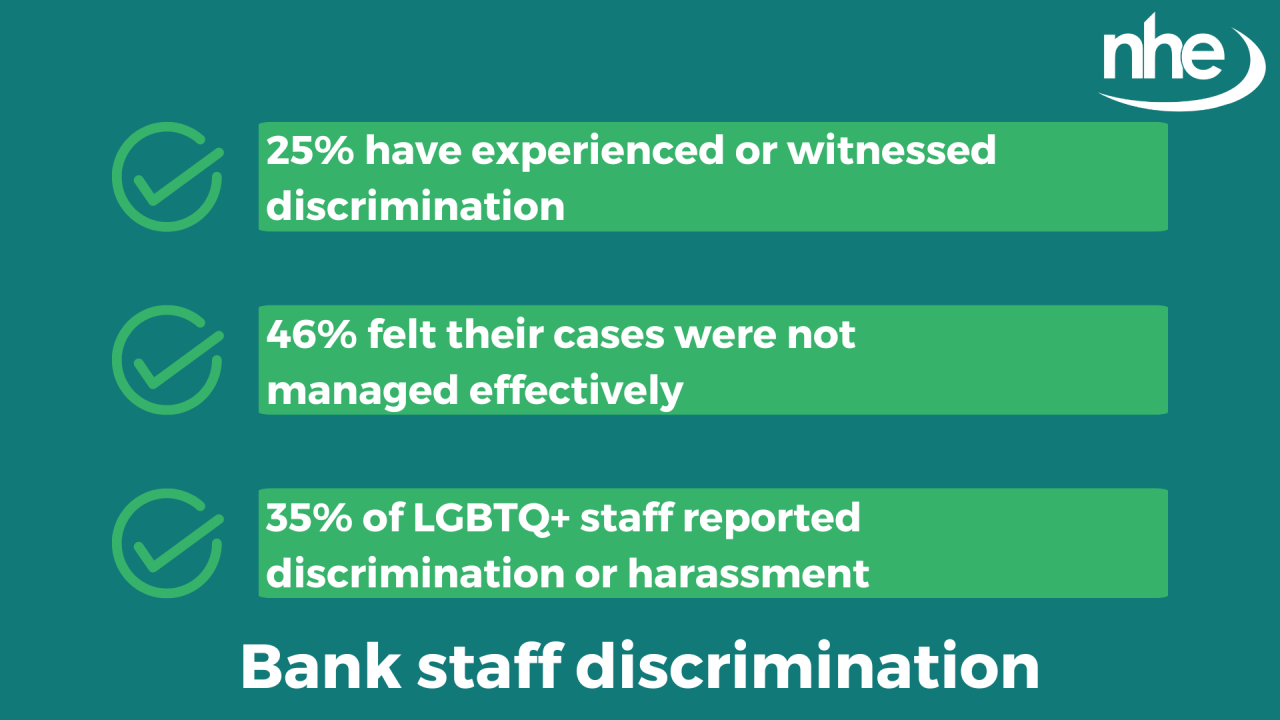According to new figures, NHS bank staff are much more likely to face discrimination compared to the national average — with almost half of cases not handled effectively.
In a survey of over 2,306 people working within a bank role, a quarter (25%) had experienced or witnessed discrimination. Alarmingly, 47% of bank staff who reported discrimination felt their cases were not managed effectively.
The data also shows that 43% of bank staff who have experienced or witnessed discrimination did not report it. This indicates that many may have lost faith in the reporting mechanisms, or fear speaking up due to a perceived lack of protection compared to permanent staff.
The new statistics also expose a significant equality gap in the experience of disabled people, LGBTQ+ individuals and women working in a bank role. Among bank staff who identify as having a disability, 42% reported experiencing or witnessing discrimination. Of this number, 54% say reported cases weren’t handled well.
Bank workers who do not identify as heterosexual are also more likely to experience discrimination or harassment at work, with 35% of LGBTQ+ bank staff reporting such experiences compared to 25% of heterosexual bank workers. Worryingly, 44% of non-heterosexual bank staff who have experienced discrimination feel as though discrimination cases are not handled well.

One bank nurse, working with the NHS, said:
“Staff choose to take on bank work for various reasons. We are fully trained and experienced clinicians committed to our roles. Bank work suited me as I have long-term illnesses, and I sometimes struggle to cope with full-time shift patterns.
“Since taking on the bank role, I have faced discrimination in the unit. Bank staff are often given the most difficult patients with limited support. I was constantly being moved between four units at short notice. My health needs were not considered at all.”
The data has also revealed female bank staff are more likely to face discrimination, with 27% reporting having experienced or witnessed discrimination, compared to 20% of male bank staff. The data also shows that 46% of women and 44% of men answered “no”, when asked if they felt reports of discrimination were handled effectively.
The nurse continued:
“The contribution and experience I make as a bank nurse is rarely considered by my colleagues and managers. I am often more experienced than permanent staff, but my time working bank across multiple locations doesn't seem to be valued or considered.
“I have been a nurse for over fifteen years, committed to providing good care for patients and I enjoy working as a team with my colleagues - full-time staff and flexible workers. However, the way I have been treated as a bank worker has had a really negative impact on me.”
Bank staff are an essential part of the NHS workforce, with an estimated 180,000 individuals employed in these roles across the UK. The data reveals a clear disconnect between the experiences of full-time and bank staff, underscoring the urgent need for improved collaboration and fairer processes.
Image credit: iStock



















